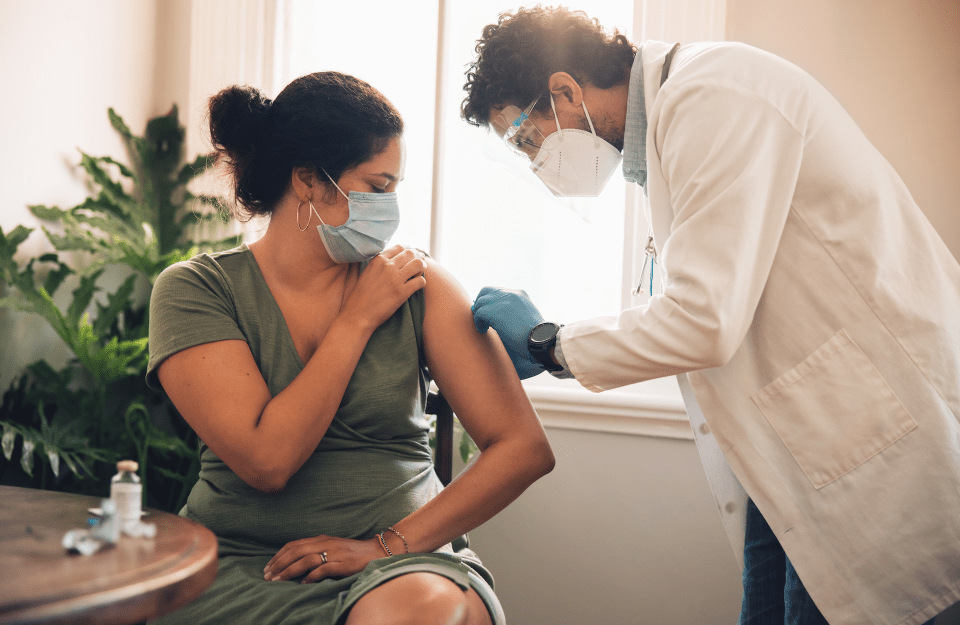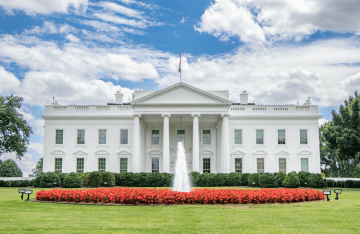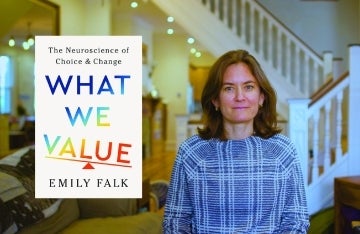State Laws Shape the Social Norms Around Vaccines — and Get People Vaccinated
In an effort to understand what encourages people to get vaccinated, researchers from the Social Action Lab and the Annenberg Public Policy Center examined how state laws and policies affect vaccination rates.

Regional differences in COVID-19- vaccination rates in the United States can be stark, with some states reporting that only half of their residents have completed the primary series of doses, while others report rates well above the national average of 70%.
There are many reasons why these differences persist, from disparities in access to healthcare to myths about vaccines.
A new study from a team of researchers in the Social Action Lab at the University of Pennsylvania and the Communication Science Division at the Annenberg Public Policy Center looked into one of these variables: social norms around vaccination and how they can be shaped by state laws and policies regarding vaccination.

“When a government implements a policy, you expect it to shape people’s behavior because policies directly channel people to perform certain behaviors,” says lead author Bita Fayaz-Farkhad, Research Assistant Professor at the Annenberg School for Communication. “We investigated another mechanism — whether there is a link between policy and behavior through changing social norms in a society.”
They found that pro-vaccination policies, like increasing funding for immunization programs or encouraging parents to vaccinate their children, positively shape social norms around vaccines — leading people to see vaccination as a normal part of life.
The researchers — Fayaz-Farkhad, Dolores Albarracín, the Alexandra Heyman Nash University Professor at the University of Pennsylvania, former Social Action Lab Research Associate Haesung Annie Jung, and former Postdoctoral Fellow at the Annenberg Public Policy Center Christopher Calabrese — carried out a survey and five experiments to identify how state by state policies affect social norms around vaccination.
According to Albarracín, “the six studies provide robust evidence that policies can foster a culture of vaccination by signaling what constituents approve of and do. As policies create norms, communicating about positive initiatives may be the fastest way to increase vaccination. Unfortunately, this research also highlights the downstream perils of failing to make vaccination recommendations when the science supports such recommendations.”
Vaccinations During Flu Season
During the 2018–2019 influenza season, as part of a project at the Annenberg Public Policy Center, the researchers polled a nationally representative sample of American adults about their beliefs regarding the flu vaccine and their intentions to get vaccinated.
At four different points during the flu season participants answered the following questions on a scale of 1 to 4 — one being “not important at all” and four being “very important”:
- How important, if at all, do you think it is that most people in your community get the flu vaccine?
- Think about the people important to you. How likely, if at all, are they to want you to get the flu vaccine this flu season?
- How likely, if at all, are you to get the flu vaccine before or during this flu season?
Researchers used their answers to calculate state-level “norm scores” and compared them to state-level immunization laws and policies.
“The scores showed that people in states with policies designed to promote vaccination had more positive social norms about vaccination and higher intentions to vaccinate,” Fayaz-Farkhad says.
COVID-19 Vaccination Policies
Following the survey results, the researchers carried out four experiments to determine how specific legislation could affect Americans’ views on COVID-19 vaccination.

In the first experiment, participants were told to imagine that they were moving to a different city for a new job.
Modeled after events in the state of Florida, participants were then randomly presented with one of two scenarios — that the city implemented a policy that recommends healthy children to vaccinate against COVID-19 or that it implemented a policy that recommends against healthy children getting a COVID-19 vaccine.
After reading the scenarios, participants shared whether they would plan to vaccinate their children for COVID-19. They also indicated what they thought others in the city would do regarding vaccinating their children.
“As expected, we saw that when people who learn about a recommendation to immunize children believe more children in their community will receive the vaccine. And this perception of norms in turn affects parents' intention to vaccinate their children against COVID-19,” Fayaz-Farkhad says. “That was consistent with our survey results.”
Researchers then tested if another policy — increasing the percentage of city funding allocated to an immunization program — would be as effective at changing social norms.
They found that it was.
“When people hear that the government is going to increase the funding allocated to vaccination, they believe that more residents are going to get vaccinated and are more likely to report that they would get vaccinated themselves,” Fayaz-Farkhad says.
What’s Next?
“The study results show that these policies really do influence social norms, “but only if the public knows about them,” Fayaz-Farkhad says. “I’m not sure that most people in a city are aware of the status of certain policies such as funding for vaccination programs. However, even some degree of awareness appears to be impactful.”
She hopes that states will not only continue to pass pro-vaccination policies, but also take an active role in communicating about them to the public.
“State policies increase vaccination by shaping social norms” was published in Scientific Reports.
Funding was provided by National Institutes of Mental Health (Grant No. MH114847; MH132415), National Institute on Drug Abuse (Grant No. DA048570), National Institute of Allergy and Infectious Diseases (Grant No. AI147487; KAI172614A), National Science Foundation (Grant No. 2031972).



